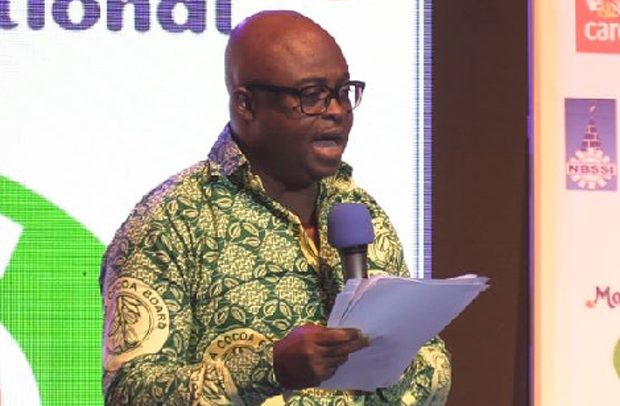Dr. Emmanuel Agyemang Dwomoh
Dr. Emmanuel Agyemang Dwomoh, Deputy Chief Executive of Ghana Cocoa Board (COCOBOD) in-charge of Agronomy and Quality Control (A&QC), has expressed worry about the inadequate cooperation of cocoa farmers with extension officers in the rehabilitation of diseased and over-aged farms.
According to him, the Cocoa Swollen Shoot Viral Disease (CSSVD) and moribund cocoa farms constitute about 40 percent of Ghana’s cocoa trees stock, and these have serious consequences on productivity per hectare.
Dr. Agyemang Dwomoh disclosed this while interacting with some cocoa farmers at Kumikrom, a farming community in Sefwi Bekwai District of the Western North Region.
He explained that the production in the region, which hitherto accounted for 30 percent of Ghana’s total production output, had declined due to the devastating effect of CSSVD.
“The Western North Region, which contributed about 330,000 metric tones, is now producing 140,000 tonnes due to the rampant nature of the CSSVD virus; this is not good for the region,” he added.
According to Dr. Dwomoh, COCOBOD is implementing the National Cocoa Rehabilitation Programme as part of efforts to tackle the menace.
The programme, he said, would help improve productivity and livelihoods of farmers.
“I want to implore you, our cherished farmers, to cooperate with COCOBOD to facilitate smooth implementation of all our Productivity Enhancement Programmes (PEPs), which include the Rehabilitation Programme,” he said.
He also cautioned farmers to desist from the use of weedicides on cocoa farms since such practices affect the quality of Ghana’s cocoa beans.
Dr. Dwomoh told farmers that plans were underway to procure motorized slashers to weed and prune their cocoa farms.
He also urged the farmers to form farmer co-operatives for easy identification and access to inputs, funds and other benefits.
The farmers commended COCOBOD for the initiative and pledged their commitment to supporting the programmes.
Dr. Dwomoh and his team visited the Western North and Brong Ahafo Regions to ascertain the situation on the ground.


